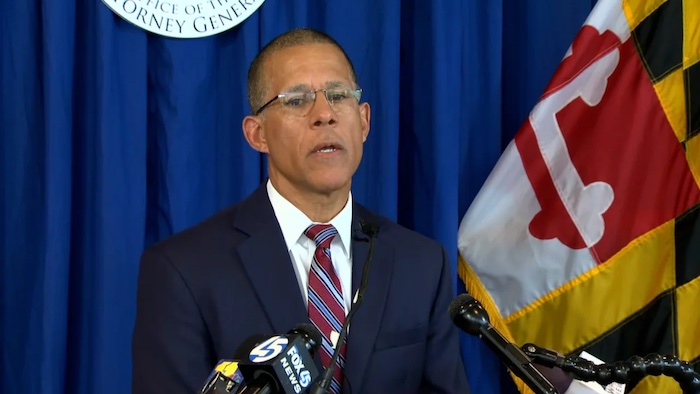
A report from Maryland Attorney General Anthony Brown released Wednesday alleges 156 Catholic clergy members and others abused at least 600 children over the course of more than six decades.
“From the 1940s through 2002, over a hundred priests and other Archdiocese personnel engaged in horrific and repeated abuse of the most vulnerable children in their communities while Archdiocese leadership looked the other way,” the report reads. “Time and again, members of the Church’s hierarchy resolutely refused to acknowledge allegations of child sexual abuse for as long as possible.”
The report lists descriptions of graphic sexual and physical abuse allegations: It includes stories of how some alleged abusers provided victims with alcohol and drugs and describes in vivid detail how they coerced and forced victims to perform sexual acts.
The report’s list of abusers includes clergy members, seminarians, deacons, teachers and other employees of the Archdiocese.
Forty-three priests who “served in some capacity or resided within the Archdiocese of Baltimore” committed sexual abuse in locations outside Maryland, the report alleged. Of these 43 priests, 40 of them allegedly committed sexual abuse in only one other location, while the other three allegedly committed sexual abuse in two other locations outside Maryland, the report says.
The investigation began in 2018 and has since received “hundreds of thousands of documents,” including treatment reports, personnel records, transfer reports and policies and procedures.
The Maryland Attorney General’s Office said more than 300 people contacted the office after it opened an email address and telephone hotline for people to report information about clergy abuse, and investigators interviewed hundreds of victims and witnesses.
“Today certainly in Maryland is a day of reckoning and a day of accounting,” Brown said during a news conference Wednesday.
Brown said he met with survivors and advocates Wednesday morning to hear their stories.
“While each of those stories is unique, together, they reveal themes and behaviors typical of adults who abuse children, and those who enable that abuse by concealing it,” Brown said. “What was consistent throughout the stories was the absolute authority and power these abusive priests and the church leadership held over survivors, their families and their communities.”
Most of the abusers listed in the report are dead and no longer subject to prosecution, the attorney general said.
“While it may be too late for the survivors to see criminal justice served, we hope that exposing the Archdiocese’s transgressions to the fullest extent possible will bring some measure of accountability and perhaps encourage others to come forward,” Brown said.
Some victims waited to report their claims of abuse until later in life, according to the report. Because Maryland recognizes a statute of limitations defense in civil cases, “victims have no recourse if they are over the age of 38,” the report reads.
Some victims did not come forward until their parents had died to “spare them the pain of knowing about the abuse,” the report reads, while others never intended to tell but were persuaded to come forward with the help of others. Others repressed their memories and recollections of abuse emerged only many years later, according to the report.
The Archbishop of Baltimore apologized on behalf of the Archdiocese after allegations of abuse surfaced in the report.
“To all survivors, I offer my most earnest apology on behalf of the Archdiocese and pledge my continued solidarity and support for your healing. We hear you. We believe you and your courageous voices have made a difference,” Archbishop William E. Lori wrote in a statement Wednesday.
“The report details a reprehensible time in the history of this Archdiocese,” Lori added, and wrote it “will not be covered up, ignored or forgotten.”
The Archdiocese began making “radical changes” in the 1990s to “end this scourge,” Lori wrote. Instances of abuse have fallen every year and every decade since cases of abuse peaked during the 1960s and 1970s, he wrote, saying, “The Archdiocese is not the same organization it was.”
“Make no mistake, however: today’s strong record of protection and transparency does not excuse past failings that have led to the lasting spiritual, psychological and emotional harm victim-survivors have endured,” the Archbishop’s statement reads.
The Archdiocese of Baltimore has paid $13.2 million to 303 victims of abuse since the 1980s, according to the Archdiocese’s office.
The payments include money for both counseling and settlements, the Archdiocese’s executive director of communications, Christian Kendzierski, said in an email to CNN.
The report contains “a full accounting” of abuse in the Archdiocese and “details of repeated tortuous, terrorizing, depraved abuse.” It lists and details 156 abusers “determined to have been the subject of credible allegations of abuse.”
More than 600 children are known to have been abused by those 156 people, the report reads, but “the number is likely far higher.”
The report reveals the names of all but 10 of the 156 alleged abusers listed in the report.
Brown said those 10 names were obtained through the grand jury process and could not be disclosed without permission or a court order.
“I should emphasize that because they’re redacted today doesn’t mean they will always be redacted,” Brown said.
The report does not constitute criminal indictment, according to the attorney general.
The report recommends that Maryland amend the statute of limitations for civil actions involving child sex abuse.
“Our judicial system should provide a means for victims who have suffered these harms to seek damages from the people and institutions responsible for them,” the report reads.
Maryland’s Senate passed a bill in March that would repeal the state’s civil statute of limitations in certain civil actions relating to child sexual abuse. The bill is working its way through the House.
Complete Article ↪HERE↩!
